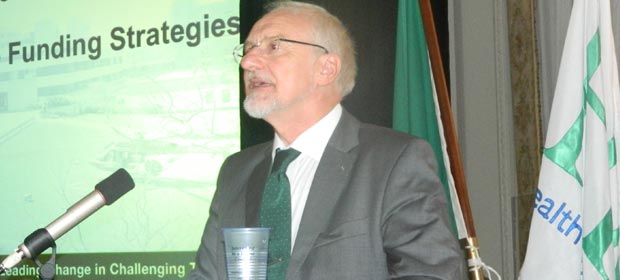The principle of insurance in his native Germany had been nearly submerged with claims for services, Heinz Kolking, President of the European Association of Hospital Managers, told the HMI Annual Conference.

Speaking on European Healthcare Funding Strategies, he said the existing attitude of claiming in Germany, overburdened the initial insurance idea. If everybody sought to regain his or her contribution, via the delivery of services, the system must collapse.
Kolking, is CEO of a medical complex in Rotenburg, near Hamburg in northern Germany. It has an 800 bed hospital, a nursing home for the elderly, a rehabilitation centre and several service companies. On an annual basis, the complex serves around 30,000 in-patients and nearly 100,000 outpatients. It has 2,000 staff, of which 300 are doctors and 700 nurses. It has created a network with 15 other medical centres.
He said that while European health systems differed in their financing, services, structure and processes, they had common challenges, particularly in regarding to financing at a time of medical innovation and demographic developments.
In the past, hospitals were often ‘administered’ but in order to shape the future we needed a very different form of management of structures and processes in hospitals. Managers now needed entrepreneurial attributes.
In Germany, despite the very significant progress in medicine and medical technology and the explosion in the list of services covered by health insurers, there were constant complaints about the explosion in cost and increasing expenses. Society and the economy needed a growing, but efficient and effective healthcare in the broadest sense possible.
Aging was an issue for the health services. “Cynics would say our social services are not designed for this. It is being said, in all seriousness, not to strengthen anti smoking policies, as smoking would result in an earlier death and remove the pension and health insurance burdens. I would argue the opposite. If the phase of ageing in our lives is proportionally getting longer, we have to change the lives we live and also our working lives. We have to create or improve conditions in order to be relatively fit when we are old and push back pension time, both of which can be achieved through medical progress.”
Successful hospitals would offer interlinked services, focused on a regional healthcare model which optimises the necessary structures and processes while being patient-centred
He said economic laws applied to healthcare whether we wanted to accept them or not. Therefore we had to alter the framework conditions in healthcare in ways that would assure quality, efficiency and effectiveness, without losing sight of the patient.
Kolking urged that we needed an appropriate cross-linking of health services, because of the increasing complexity of treatments, and because of the necessary interaction between prevention, diagnosis, treatment and rehabilitation.
For hospitals this meant a considerable change in structures, because the services offered would be more integrated with a cross-linking of many specialists in wide areas. Telemedicine would also have an increasing role to play.
We needed a financing system that rewarded efficiency, effectiveness and quality of structures processes and results.
Accreditations were required for medical and technical infrastructure and the criteria for staff qualification or standardised processes on the basis of medical guidelines or care principles.
For the development of such structures, ambitious management and highly competent managers were necessary.
He said successful hospitals would offer interlinked services, focused on a regional healthcare model which optimises the necessary structures and processes while being patient-centred.
“Current changes require large investments. In Germany until now, these investments have been financed solely by the state. But one can see this changing, and there are indications of the necessity to find other sources of financing.
“For the survival of the institution it is necessary to create access to the capital market and also other financing sources. This involves the generation of profits and fundraising, which in turn requires the strengthening of the economic basis through co-operation and fusions between hospitals. There should also be diverse partnerships in the areas of research, teaching and with industry.

